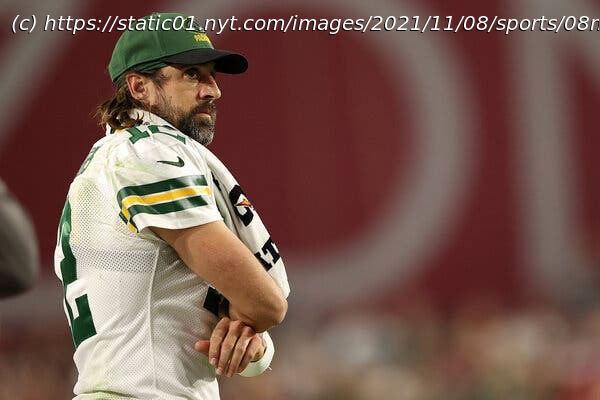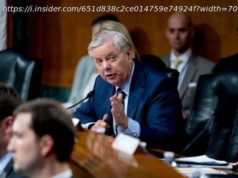The Green Bay Packers quarterback, one of the most visible athletes in the country, last week used anti-vaccination rhetoric as his reasoning for not getting vaccinated against Covid-19.
This spring, he was auditioning to be the host of “Jeopardy!” Nearly every day, he pops up on television ads for national brands like State Farm insurance. And on Sundays this fall, he has led the Green Bay Packers to a division-best 7-2 record. Quarterback Aaron Rodgers is not just the N.F.L.’s reigning most valuable player, he’s a celebrity who transcends the nation’s most popular sport, a household name on par with Tom Brady and Patrick Mahomes. So when news broke that he tested positive for the coronavirus last week and was unvaccinated, Rodgers justified his decision to not get vaccinated by speaking out against the highly effective vaccines and spewing a stream of misinformation and junk science. Medical professionals were disheartened not just because it will make it harder for them to persuade adults to get vaccinated, but because they are also starting to vaccinate 5- to 11-year-olds. “When you’re a celebrity, you are given a platform,” said Dr. Paul A. Offit, the director of the Vaccine Education Center at the Children’s Hospital of Philadelphia. “When you choose to do what Aaron Rodgers is doing, which is to use the platform to put out misinformation that could cause people to make bad decisions for themselves or their children, then you have done harm.” The N.F.L. is investigating whether Rodgers and the Packers violated any of the league’s expansive Covid-19 protocols, which were developed with the N.F.L. Players Association. Rodgers admitted to flouting those protocols, including attending a Halloween party with teammates where he appeared in videos unmasked. The Packers and Rodgers could be fined hundreds of thousands of dollars for failing to adhere to the rules. Rodgers is in the midst of a 10-day isolation period and did not play in the Packers’ 13-7 loss to Kansas City on Sunday. Like all unvaccinated N.F.L. players who test positive, Rodgers must provide two negative tests, taken 24 hours apart, after his isolation to return to the field, which could come as soon as Saturday. The lasting damage from Rodgers’s stance, though, cannot be measured in dollars or games lost or won. Vaccination rates in the N.F.L. are very high compared to the general population. Nearly every coach and staff member who is around players is vaccinated, and 94 percent of the 2,000 or so players have also been inoculated, according to the league. But given how popular the league is, even the handful of unvaccinated players get outsize attention. Wide receiver Cole Beasley of the Buffalo Bills, and quarterbacks Kirk Cousins of the Minnesota Vikings and Carson Wentz of the Indianapolis Colts have all been criticized for choosing to remain unvaccinated. But they were upfront about their decisions. Rodgers, by contrast, evaded answering directly when asked if he was vaccinated. He said he was “immunized.” In an interview on The Pat McAfee Show last week, Rodgers said he followed his own “immunization protocol,” though he did not provide details about what it entailed. But vaccination and natural infection are the only ways to gain immunity to the virus, scientists said.
Home
United States
USA — Science Scientists Fight a New Source of Vaccine Misinformation: Aaron Rodgers






